NYSCF Community Showcased at the International Society for Stem Cell Research Conference
On June 14-17, the International Society for Stem Cell Research (ISSCR) held its annual conference in Boston, convening the...On June 14-17, the International Society for Stem Cell Research (ISSCR) held its annual conference in Boston, convening the world’s brightest minds in stem cell research and regenerative medicine. The 4-day program covered the latest and most significant advances in the field, including new tools and technologies, the next generation of embryo and disease models and emerging cell therapies.
“Together, we have the power to transform science and improve lives,” noted ISSCR President Dr. Haifan Lin as he welcomed over 4,000 scientists and industry professionals from more than 75 countries to the world’s largest stem cell event.
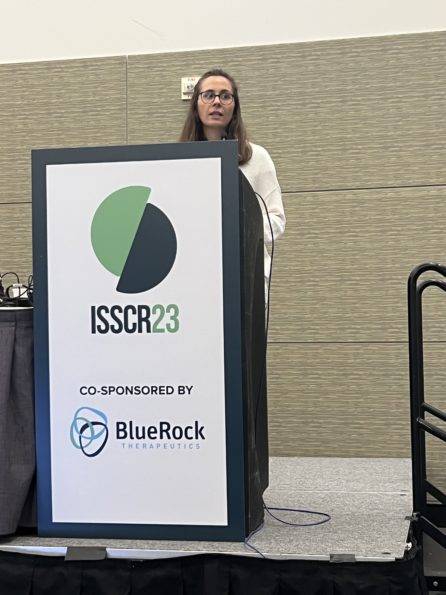
NYSCF’s contributions to the stem cell field were showcased prominently. In a packed session on iPSC differentiation for clinical applications, NYSCF – Lisa Dean Moseley Foundation Fellow Paula Alonso-Guallart, DVM, PhD, delivered an insightful talk on NYSCF’s efforts to advance a cell therapy for Type I Diabetes. This work, being carried out in collaboration with NYSCF – Robertson Stem Cell Investigator Alumnus Deepta Bhattacharya, PhD (University of Arizona), uniquely combines gene editing in stem cells to evade the immune system with NYSCF’s automated platform to make functional pancreatic organoids (human pancreatic tissue made from stem cells).
The NYSCF Global Stem Cell Array®, our fully robotic platform for stem cell derivation and differentiation, was also featured in poster presentations. NYSCF’s Senior Vice President of the Discovery and Platform Development Daniel Paull, PhD, shared how large-scale biology enabled by the Array has made it possible to create the first human stem cell models of post-traumatic stress disorder (PTSD) and reveal the hypersensitivity of neurons from PTSD to stress, featuring work done in collaboration with Kristen Brennand, PhD (Yale University) and Rachel Yehuda, PhD (Icahn School of Medicine at Mount Sinai and Office of Veterans Affairs).
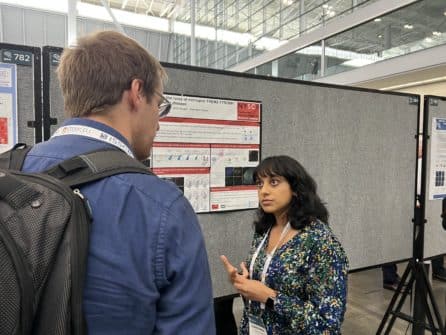
NYSCF’s Staff Scientist Yinan Wang, PhD, updated attendees on how his team is automating the differentiation of stem cells into natural killer (NK) cells – a type of immune cell with potent anti-tumor effects –, and how he is culturing them together with patient-derived 3D models of ovarian tumors (established by NYSCF’s Laura Andres-Martin, PhD) to advance new therapeutic options for this deadly cancer. Finally, NYSCF – Druckenmiller fellow Chandrika Rao, PhD, and Postdoctoral Fellow Yasmine Nonose, PhD, presented posters on the prominent role that the immune cells of the brian, called microglia, play in Alzheimer’s and Parkinson’s disease, respectively.
Notably for this year, NYSCF was proud to partner with ISSCR on the meeting’s equity, diversity and inclusion (EDI) focused session, which this year was focused on creating inclusive environments in research. NYSCF’s Vice President of Scientific & Diversity, Equity, Inclusion and Belonging (DEIB) Outreach Raeka Aiyar, PhD, moderated a thought-provoking panel discussion that featured perspectives from across the research pipeline. Panelists Evan L. Graham, PhD (Biosero), NYSCF – Robertson Stem Cell Investigator Shruti Naik, PhD (New York University), NYSCF – Robertson Stem Cell Investigator Alumni Valentina Greco, PhD (Yale Medical School) and Takanori Takebe, PhD (Cincinnati Children’s Hospital), discussed topics such as mentorship and allyship, advice on how to navigate toxic environments, the notion of meritocracy in science, and the need for metrics beyond publications to evaluate productivity. They also highlighted helpful lab and institutional policies that go beyond recruitment and representation to promote the retention and wellbeing of scientists from all backgrounds.
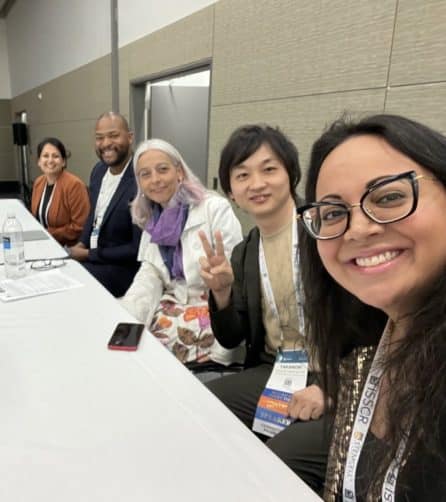
“We need to talk to leaders about the disconnect between their perceived view of meritocracy and the reality that we live in, which is quite far away from being a meritocracy,” remarked Dr. Naik during the discussion.
Many NYSCF Innovators gave talks at the meeting as well, including NYSCF–Robertson Stem Cell Investigator Shruti Naik, PhD (New York University), the newly appointed NYSCF—Druckenmiller Fellow Kentaro Iwasawa, PhD (Cincinnati Children’s Hospital), and NYSCF–Robertson Stem Cell Investigator Alumni Kristy Red-Horse, PhD (Stanford University) and Jay Rajagopal, MD (Harvard Medical School), who spoke at a plenary session. In addition, NYSCF–Robertson Stem Cell Investigator Alumna Malin Parmar, PhD (Lund University), shared updates on her team’s investigational cell therapy for Parkinson’s disease, which reached its first patient earlier this year as part of a clinical trial in Sweden, while NYSCF—Robertson Stem Cell Investigator Evangelos Kiskinis, PhD (Northwestern University) outlined his exciting applications of patient iPSC models of amyotrophic lateral sclerosis (ALS) to identify disease mechanisms and therapeutic approaches.
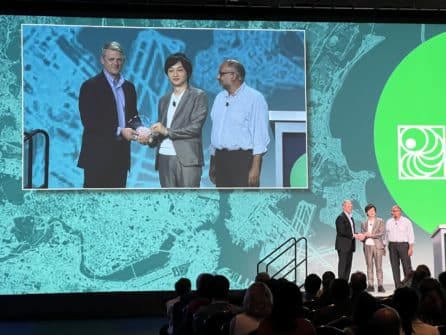
During a crowded fourth plenary session, NYSCF–Robertson Stem Cell Investigator Alumnus Takanori Takebe, PhD (Cincinnati Children’s Hospital) was recognized with the 2023 ISSCR Outstanding Young Investigator Award, and gave an inspiring lecture on his journey to engineer accurate models of the human liver using stem cells. During his award acceptance speech, Dr. Takebe offered very kind words to all those who helped him along the way, highlighting the pivotal role that the NYSCF – Robertson Investigator Award and community played at the beginning of his career.
NYSCF Innovators have won this award in 7 of the last 11 years.
The conference concluded with an awards and keynote session, which was introduced by the incoming ISSCR president and 2023 NYSCF Conference keynote speaker Amander Clark, PhD (University of California, Los Angeles), who made a pledge to advocate for minoritized scientists, and to continue to foster transparency and trust in how science becomes medicine.
We are honored to be part of such a dedicated and brilliant global community and inspired to continue our collaborative work to accelerate stem cell research towards cures.
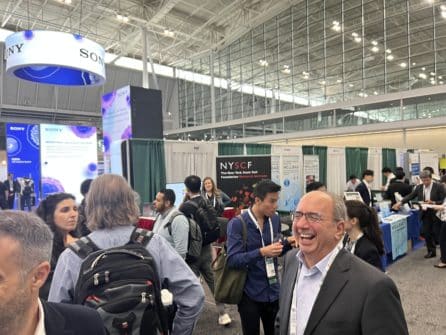
For more on the ISSCR conference, check out the conference website and the #ISSCR2023 hashtag on Twitter and LinkedIN.

